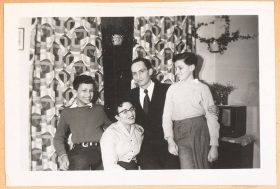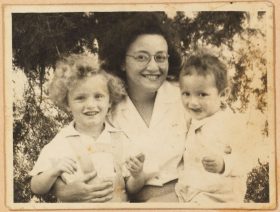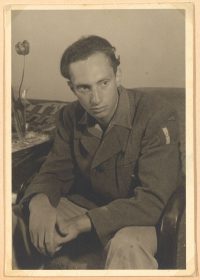The sixth and final installment in our blog series “Memories from the Life of Walter Frankenstein”

The Frankenstein family in their apartment, Bandhagen (outside of Stockholm), around 1956–1957; Jewish Museum Berlin, gift of Leonie and Walter Frankenstein
To start from the beginning again: when I consider the path that Walter Frankenstein and his family took, I’m constantly astonished that they didn’t lose hope and always found new strength to confront the numerous changes in their lives. In 1956, the final big challenge in the lives of the four Frankensteins got underway.
→ continue reading
The fifth episode in our blog series “Memories from the Life of Walter Frankenstein”

Leonie Frankenstein with her sons Peter-Uri and Michael, Hadera, 1947; Jewish Museum Berlin, gift of Leonie and Walter Frankenstein
Finally reunited after 19 months! —A summer 1947 photo of Leonie, Uri, and Michael Frankenstein makes clear how overjoyed the three were about Walter’s release. All three gaze relieved into the camera. At first, Walter moved into the one-room apartment in a public housing building in Hadera that had been allocated to Leonie and the children following their emigration to Palestine. In the mean time, Leonie had learned Hebrew and found employment at a chocolate shop. Her work had allowed her to support herself and her sons in her husband’s absence. → continue reading
The fourth episode in our blog series “Memories from the Life of Walter Frankenstein”

Walter Frankenstein during his time in the kibbutz, Greifenberg, around December 1945–May 1946; Jewish Museum Berlin, gift of Leonie and Walter Frankenstein
What were they to do now? Nothing was left of the Frankensteins’ old life. Their relatives and friends had been murdered, including Walter and Leonie’s mothers. All of Europe lay in ruins.
The first step in the Frankensteins’ new life was a simple administrative act: they registered with the Jewish Community of Berlin and were assigned an apartment. However, due to the bad supply situation, they were advised to leave Berlin as soon as possible. Nevertheless, they decided to spend the summer in Berlin. Walter volunteered as a manager for the Neukölln Leisure Games. At the same time, he made contact with the Jewish Brigade. Over the course of the war, the British Mandate government had drastically reduced the channels for legally entering Palestine. That meant that for the roughly 250,000 displaced persons ( DPs) in camps in western Europe, illegal entry was often the only way to reach Palestine. Walter managed to arrange an opportunity for legal emigration for Leonie and the children through the members of the Jewish Brigade. In return, he promised to smuggle young Jews southward through Germany for the Brigade. Their destinations were harbors on the Mediterranean where underground Jewish organizations prepared ships for their illegal entry into Palestine.
→ continue reading


